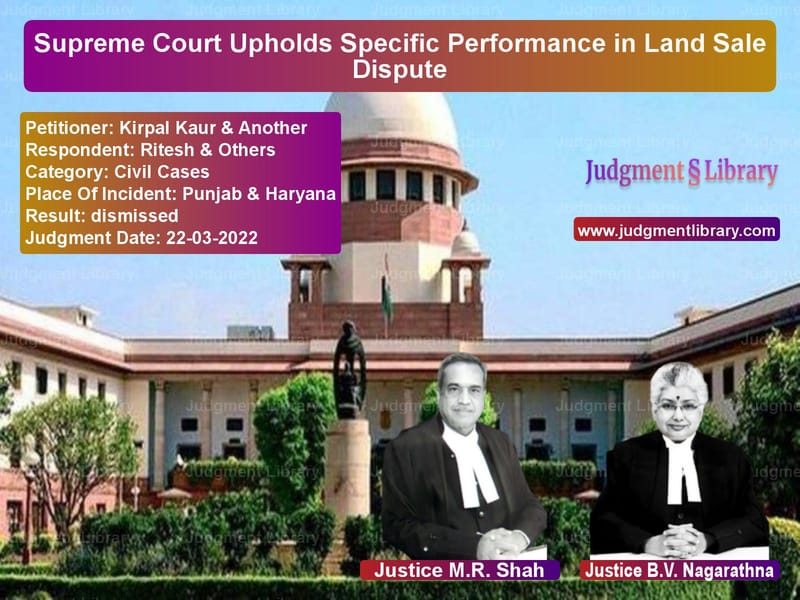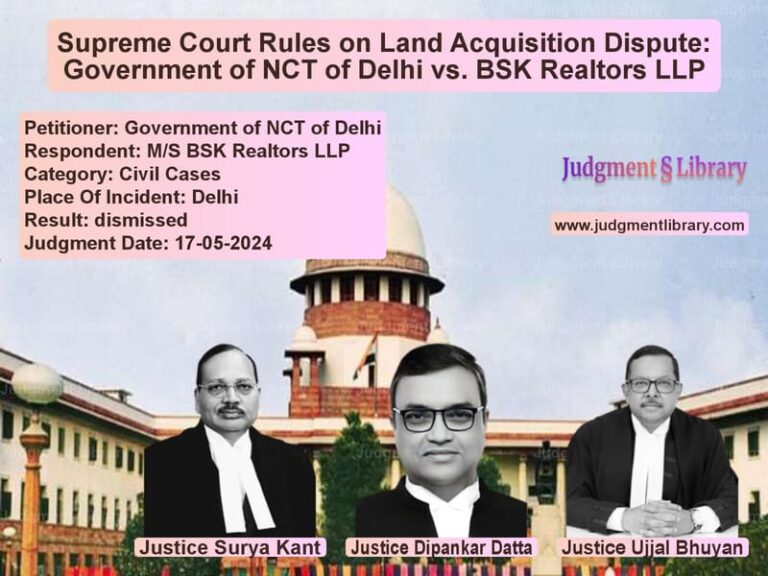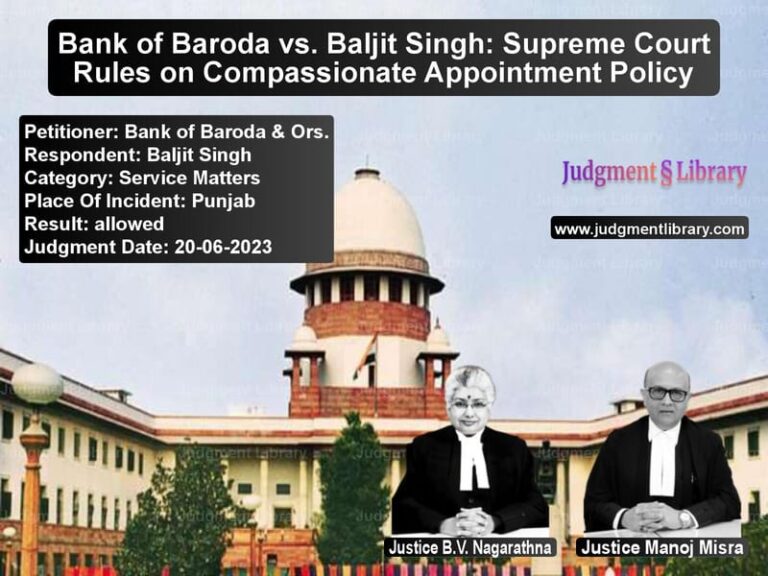Supreme Court Upholds Specific Performance in Land Sale Dispute
The Supreme Court of India, in its judgment dated March 22, 2022, ruled on the case of Kirpal Kaur & Another vs. Ritesh & Others. The case involved a dispute over a land sale agreement, where the respondents sought specific performance of an agreement to sell. The Court dismissed the appeal by the original defendants, upholding the judgments of the High Court and the First Appellate Court, which had granted specific performance of the contract.
Background of the Case
The case revolved around a piece of land measuring 8 kanals in village Nilokheri, District Karnal. The land was originally owned by Gurmeet Singh, who executed an agreement to sell the land to Jai Parkash on February 11, 2004, for a total consideration of Rs. 4,00,000/-. The agreement stated that Rs. 3,50,000/- was paid as earnest money, and the remaining Rs. 50,000/- was to be paid at the time of execution of the sale deed, scheduled for February 10, 2005.
Jai Parkash passed away before the execution of the sale deed, and his legal representatives (the respondents) stepped into his shoes. They claimed that they were ready and willing to perform their part of the contract and had even reached the Sub-Registrar’s office on the scheduled date with the balance amount. However, the defendants (legal heirs of Gurmeet Singh) refused to execute the sale deed, leading the respondents to file a suit for specific performance.
Petitioner’s Arguments (Kirpal Kaur & Others)
The petitioners contended:
- The agreement to sell was merely a security document for repayment of a loan taken by Gurmeet Singh from Jai Parkash.
- Gurmeet Singh was illiterate and addicted to vices, and Jai Parkash, a cloth shop owner, fraudulently obtained his thumb impression on blank papers.
- The defendants continued to remain in possession of the land, and no actual possession was ever given to the vendee.
- Since the property was agricultural land and the only source of livelihood for the defendants, granting specific performance would cause them undue hardship.
Respondent’s Arguments (Ritesh & Others)
The respondents argued:
- There was no evidence to suggest that the agreement was a security document.
- The trial court itself found that the agreement was validly executed for a sale consideration.
- They were always ready and willing to perform their obligations under the contract.
- The petitioners had not appealed against the trial court’s finding that the agreement was genuine, meaning this finding had attained finality.
Supreme Court’s Observations
The Supreme Court, comprising Justices M.R. Shah and B.V. Nagarathna, ruled in favor of the respondents, upholding the grant of specific performance.
On the Validity of the Agreement
The Court stated:
“All courts below have recorded concurrent findings that the agreement to sell was duly executed by Gurmeet Singh in favor of Jai Parkash. This finding does not warrant interference.”
On the Claim that the Agreement Was a Loan Document
The Court held:
“Merely because the agreement mentions that the vendor required money for his daughter’s marriage does not make it a loan document or a security agreement.”
On the Petitioners’ Possession Argument
The Court observed:
“Possession was never transferred to the vendees, but this does not alter the nature of the agreement. The obligation to execute the sale deed remains unaffected.”
On the Grant of Specific Performance
The Court ruled:
“Once execution of the agreement and receipt of substantial sale consideration is proved, the decree for specific performance is justified.”
On the Issue of Hardship
The Court rejected the argument that specific performance should be refused due to the petitioners’ hardship, stating:
“The defendants cannot claim hardship when they willingly entered into an agreement for sale.”
Final Verdict
The Supreme Court ruled:
- The appeal is dismissed.
- The decree for specific performance is upheld.
- The original plaintiffs must pay an additional amount of Rs. 3,50,000/- to the defendants over and above the remaining balance of Rs. 50,000/-.
- The sale deed must be executed after payment of the additional amount.
Implications of the Judgment
This ruling establishes several key legal principles:
- Specific performance is the rule unless proven hardship justifies denial.
- A claim that an agreement is a loan document must be supported by evidence.
- Possession not being transferred does not affect the validity of a sale agreement.
- Once concurrent findings on execution and consideration exist, higher courts should not interfere.
Conclusion
The Supreme Court’s ruling in Kirpal Kaur vs. Ritesh reinforces the sanctity of contracts and affirms that courts must uphold agreements unless fraud or hardship is clearly established. The judgment ensures that parties cannot escape contractual obligations based on mere allegations, promoting fairness in land transactions.
Petitioner Name: Kirpal Kaur & Another.Respondent Name: Ritesh & Others.Judgment By: Justice M.R. Shah, Justice B.V. Nagarathna.Place Of Incident: Punjab & Haryana.Judgment Date: 22-03-2022.
Don’t miss out on the full details! Download the complete judgment in PDF format below and gain valuable insights instantly!
Download Judgment: kirpal-kaur-&-anothe-vs-ritesh-&-others-supreme-court-of-india-judgment-dated-22-03-2022.pdf
Directly Download Judgment: Directly download this Judgment
See all petitions in Property Disputes
See all petitions in Specific Performance
See all petitions in Judgment by Mukeshkumar Rasikbhai Shah
See all petitions in Judgment by B.V. Nagarathna
See all petitions in dismissed
See all petitions in supreme court of India judgments March 2022
See all petitions in 2022 judgments
See all posts in Civil Cases Category
See all allowed petitions in Civil Cases Category
See all Dismissed petitions in Civil Cases Category
See all partially allowed petitions in Civil Cases Category







